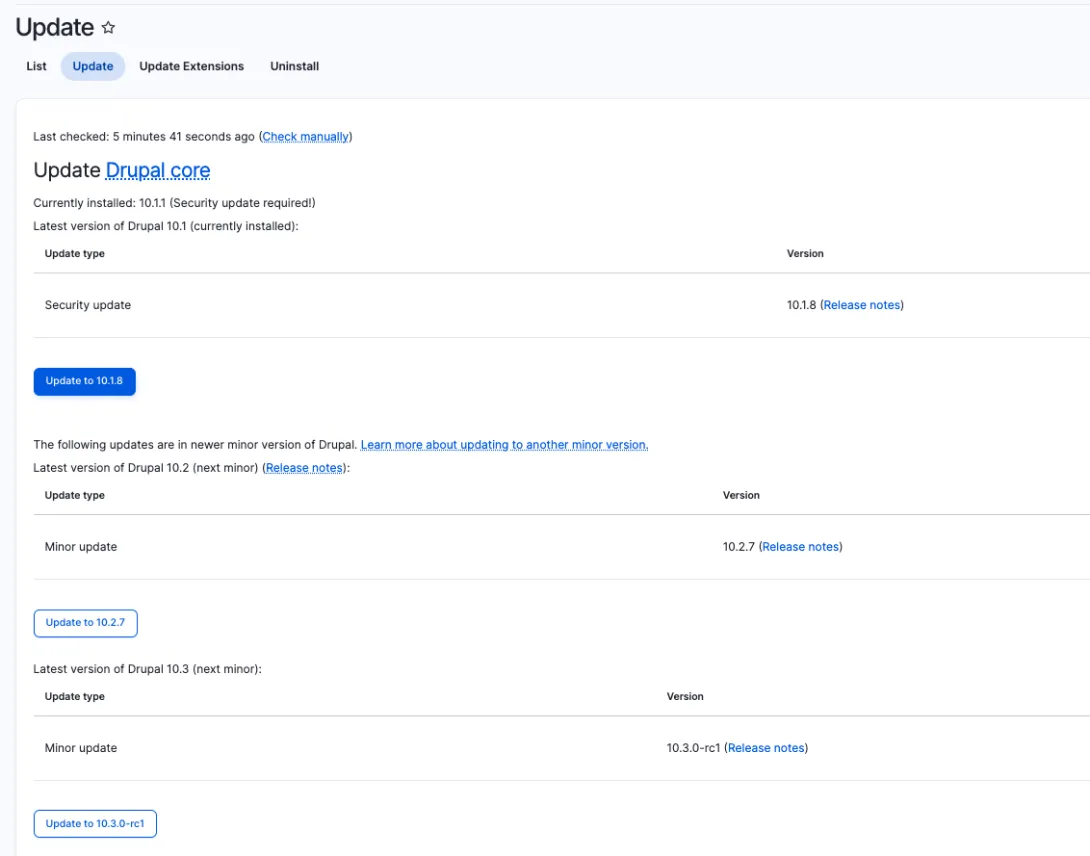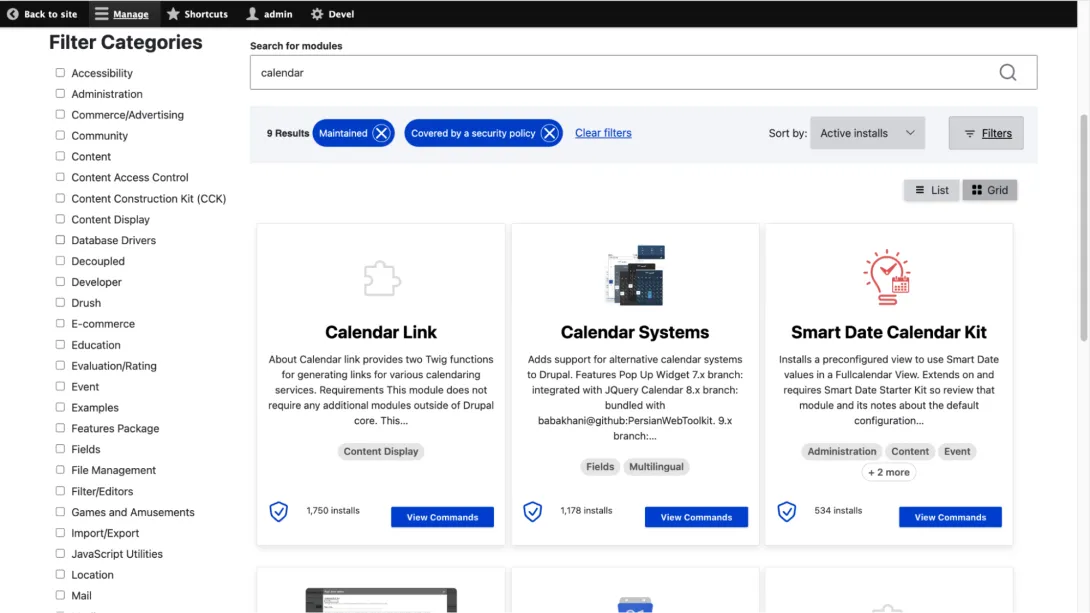For those that aren’t aware, the Drupal Association (DA) is the organization that maintains the Drupal.org infrastructure, puts on DrupalCons, and generally tries to further and safeguard Drupal in the wider web development world. They’re a vital part of the Drupal ecosystem, and their work affects us all.
The DA is made up with a bunch of absolutely wonderful people that work there. The team is “small but mighty” and includes engineering folks like longtime Drupalers Tim and Neil, as well as marketing and business people who are newer to Drupal. It’s led by Tim Doyle, who is affectionately known as “T2” (since Tim Lehnen is the O.G. “T”).

Above the staff, the DA is led by its board of directors. This board sets the direction and goals of the staff. T2 leads the staff on the execution of these directions and goals. I served on the board for two years, and I can honestly say that it’s made up of great and thoughtful people who want the best for Drupal.
The DA has a monumental task for its size. Besides “keepin’ on keepin’ on”, the DA is responsible for Drupal integrations into DA infrastructure (think drupal.org, Gitlab, updates, etc). It’s responsible for marketing Drupal. It’s responsible for documentation infrastructure. And it’s responsible for putting on the North American DrupalCon (Atlanta in 2025!).
The Drupal Association’s biggest and toughest challenge is funding. If we could figure this out, it would make everything else easy. Currently, the DA primarily gets its funding from sponsorships. These include advertisements, certified partner programs, DrupalCon sponsorships, and the membership (recently renamed to Ripple Makers).
Five ideas
Below I’m going to lay out some rough visions… some good, and some bad. The first three ideas are to help with securing funding (which IMO is the biggest challenge of the DA) and the second two ideas are some ways to spend that money that will grow the community.
Idea 1: Training and certifications
The Drupal Association should create its own certification program. Currently Acquia offers the only certification program. Although Acquia is one of the largest Drupal companies (and was founded by Drupal’s founder) they should not control the certifications. I’d love to see the DA take over Acquia’s program, or subcontract it out (there are several 3rd party organizations that do this).
Furthermore, I’d support the DA doing more video training. Currently the go-to website for this is Drupalize.me (which is run by a great group of folks). Maybe the DA could purchase this so it could provide ongoing revenue?
Several other open source foundations fund themselves through similar means. Note that the certification idea isn’t my original idea, but it's a good one.
Idea 2: Charge money for use of DA infrastructure for automatic updates
The Automatic Updates module has been in the works for several years. It promises to do updates automatically, consistently, and securely for those that enable it. However it will connect to Drupal.org servers to get updates.

My idea is to charge for the service of using the Drupal.org infrastructure for these updates. My thought is to charge a very nominal charge (maybe $5/month). If you don’t want to pay to use this infrastructure, you could either roll your own (with open source code), or continue doing updates as we do now. The DA could even ship high priority (think “Drupalgeddon”) security updates for free.
My guess is that mostly smaller sites will make use of auto-updates. If we get 17,000 of them paying $5/month to use the Drupal.org infrastructure, that would generate over one million dollars of revenue to the Drupal Association.
Furthermore, this would create a direct lever from the number of active Drupal sites to the Drupal Association’s funding. It would also further incentivise the DA to actively work on growing the total number of sites.
Idea 3: Integrate option to display “premium” recipes/themes/modules within Project Browser
The Project Browser initiative has also been happening for several years. It provides a fancy user interface for finding, choosing, and installing Drupal modules, themes, and recipes.

My thought is that we should add a “Show premium” checkbox that would allow Project Browser to display selected “for pay” themes, modules, and recipes. Then the Drupal Association would take a certain percentage (~25%) of the revenue. In addition, there would be dramatically more sponsorships at DrupalCon by companies who are advertising their premium projects. I believe this would also generate millions of dollars.
I think this would benefit Drupal on more than one level:
- If we had recipes that put together a whole site, we could rapidly grow Drupal’s market share.
An example of this is a person wanting to put together a church website. They’d pay $200 for the recipe (the DA would make $50). It would pull down modules (date modules, podcast, etc), a theme that’s integrated into these, and set up sample content. The end user would only need to update their content. - Companies that are selling the premium recipes would want to advertise them at DrupalCons. This would also generate more revenue for the DA. If you’ve ever been to WordCamps (WordPress’s local conferences), you can see this in action.
Idea 4: Overhaul documentation
Drupal’s documentation is a hodgepodge of diamonds and 💩. It’s tough to find answers for what you need, and newbies are frequently directed by search engines to old pages that are only relevant for Drupal 6 or 7.
Meanwhile, our competitors have amazing documentation. Laravel’s documentation is stunning. React’s documentation is glorious, and WordPress’ documentation is well thought out.
My idea (which I’m sure is not novel) is to radically overhaul the documentation into a system that eases maintenance, makes it easier to keep updated, separates based on version, and has tender loving care built in.
To do this we need a new system (not necessarily Drupal) to manage the docs. The docs need to be version controlled. And we also need a full time employee to manage it all to insert tender loving care. We should split documentation between “official” and “community”. The hired person would have authority to move documentation either way.
This idea is actually in the works (I believe the DA is currently figuring out how to fund this). I’ve been working (alongside John Doyle and several others) on helping to make this happen.
Idea 5: DA Funding for promoting Drupal in the wider web dev community
Pantheon has a “Heroes Program”, where members can apply to speak at conferences and at some point mention that they use Pantheon. The Drupal Association should replicate this with several differences.
- The DA should fund people that want to attend web development conferences outside of our insular community. This includes conferences with topics such as SEO, marketing, open source, CMS, etc.
Note that the DA did something similar where it invited several companies to Web Summit (which is a huge general web conference). This would be different because it would fund speakers (not sponsorships), and many people would be able to participate. - The DA should fund people to write about Drupal in wider web development publications. I’ve personally written several articles for Smashing Magazine, and have more planned. I’ve also written for CSS Tricks. But I’m not aware of any other people doing the same. It would be amazing if the DA could motivate other people to do similar articles.
How to help
Do you have thoughts on this? Do you want to help? Well, here’s how you can do so:
1. Vote in the board of directors election.
If you’re a member of the Drupal Association, you will receive an email from “Helios Voting Bot”. In this email you will find info on how to vote. Before doing so, check out the candidates and see if what they say is important to you.
2. If you’re not a member of the Drupal Association, WTF? Seriously… join!
I make all of my income off of Drupal… which is built using the free labor of others. If you also make money off of Drupal, join the Drupal Association Ripple Makers today. You can do so for as little or as much of a donation as you like. We all should really should be giving back.
Wrapping up
Please remember that none of these are official Drupal Association initiatives. I'm putting them out there so we can get some community discussion and maybe something official will eventually happen. Before you tear a hole into all of my ideas, please remember that I took the time to write this because I care. Commenting is open for anonymous users below (please don’t post any Viagra ads), so please let me know your thoughts.
Thanks to AmyJune and Aaron Winborn Award Winner Mike Anello for helping to review.
Hey you! Leave a comment!5
Seriously... I really like it when people let me know their thoughts and that they've read this.
Awesome ideas Mike
These are all great ideas and I hope we can move forward with them.
I think there should be a $50 per year fee to operate a public Drupal site, collected by the Drupal hosts and given to the Drupal Association. Rough numbers, If there are 300,000 active Drupal sites that would yield $15 million. There would be exceptions and caps per organization (some universities have approx 1000 or so Drupal sites). You wouldn't pay for local or dev servers, just the public production servers. Most of us are paying 4, 5, or 6 figure annual sums for hosting; this Drupal fee is small in comparison.
This would allow the DA to employ the core commiters and hire people to revamp the documentation.
Right? $50/year would be nice. Unfortunately not possible because of Drupal's licensing.
Hello Mike,
Let me start by saying, I appreciate your creative thinking about ways to help the DA improve, both funding and function! I totally agree that with more funding the DA can help provide even greater value for the project and community.
However, I have concerns about some of the proposed funding ideas. I am always concerned about how funding initiatives might affect the relationship between the community and the project(s). Any monetization efforts need to be balanced to ensure we don't cannibalize or sacrifice the integrity of Drupal.
Idea 1: Training and certifications
In general, I like this idea. I think it gives more credibility to the certifications if they are official Drupal certifications. Acquia certainly has a well-known and respected reputation in the Drupal community, but if someone is new to Drupal, Acquia may not be as well-known. I think it would broaden the appeal of the certifications if they were Drupal certifications. I also think we'd be able to reach more Drupal users / agencies by offering the certifications directly from Drupal.org.
The training side is a bit more nuanced, I think. Drupalize.me is certainly respected in the Drupal training space, but they aren't the only ones. If we're talking about licensing or purchasing training programs from a specific vendor, we're essentially picking winners / losers. While the intentions are fantastic, and expanding access and visibility of Drupal training is an overall good for the community, we need to be cognizant of how that might impact other vendors.
I am not saying we should abandon this, but maybe we could devise a different way to offer training. Maybe we can have an official training, let the different vendors contribute their content / programs, and somehow audit those programs to ensure the quality and content meet certain standards?
I definitely think this warrants more investigation.
Idea 2: Charge money for use of DA infrastructure for automatic updates
I completely disagree with this idea. If and when automatic updates lands, it will be a critical feature for many sites, and a major selling point, especially for non-profits, clubs, and associations. Even if it is explained in plain text, this will feel like a major bait and switch. The result will be lost trust. Why would I, in good faith, burden my organization with paid updates (figuring out who has a credit card on file, trying to gain access after someone leaves the organization, etc) when other platforms offer this for free?
Then there is the slippery slope. First it's auto-updates, what's next? Experience Builder? Project Browser? Access to documentation? Premium support?
I would be more onboard with additional donation nags, like in the installer and the status report.
Idea 3: Integrate option to display “premium” recipes/themes/modules within Project Browser
I don't know about this one. To me, one of the things I appreciate about the Drupal ethos is that I am not constantly bombarded with freemium modules. I think this might usher in such a paradigm.
While I do think it would be healthy for the Drupal ecosystem to have more commercial modules and themes, what are the repercussions? I haven't purchased a commercial theme or module since D6 and what a nightmare that turned into! I was never able to make the changes I wanted, I couldn't update, and the author stopped supporting it not long after I purchased it. It's one of the reasons I became a Drupal developer.
If I find a commercial theme right there in Project Browser, there is automatically a connection between the theme and Drupal as a whole. What assurances do we have that it will be supported and for how long? If it doesn't work as advertised, or the seller is a jerk, that will make Drupal look bad. You could say that about the current contrib ecosystem, but when you're asking for money, there is a higher expectation.
And what will that do to the existing contrib ecosystem? Will devs be as interested in creating / maintaining free and opensource modules and themes if they see others making money on their work?
Finally, I am not sure that advertising at DrupalCon will be as big a draw as it might seem. I've been a Drupal member for nearly two decades, I've never been to a DrupalCon. I am not sure attendees of DrupalCon are really the audience for commercial products anyway. Rather, I see these commercial developers pushing for broader exposure, more advertising opportunities.
Maybe I am a bit jaded here. I might be more onboard with this idea if we had some sort of program for commercial providers. Some sort of vetting process, strict rules about code, and assurances of support at a minimum.
Idea 4: Overhaul documentation
100%. Though, I am one of those who thinks Drupal should try to use Drupal when possible. It's a content management system, documentation is content. We should dogfood Drupal.
Super curious to learn more about the documentation initiative.
Idea 5: DA Funding for promoting Drupal in the wider web dev community
Yes!!! We need to be everywhere. I'd throw out dev.to because that is the one I tend to read, though it seems like every post is React these days.
I am jealous of your writing, I hate writing so I don't practice, and it shows.
I'd like to throw out Idea 6: find a way to sponsor developers and/or specific projects.
So many cool projects die on the vine because lack of funding. It's brutal when a site owner depends on a module that never gets bug fixes committed, or never makes the compatibility upgrades to newer versions of Drupal (Rector helps so much, but still...). This will be exacerbated when non-devs are installing stuff using Project Browser.
I hope my thoughts don't come off as negative or defeatist, I don't intend to be contrary. There are so many things I love about Drupal and the community, I want to see it grow and be successful. I also recognize the need for more revenue. I just think we need to think all the way through it.
Thanks for all you do for Drupal!